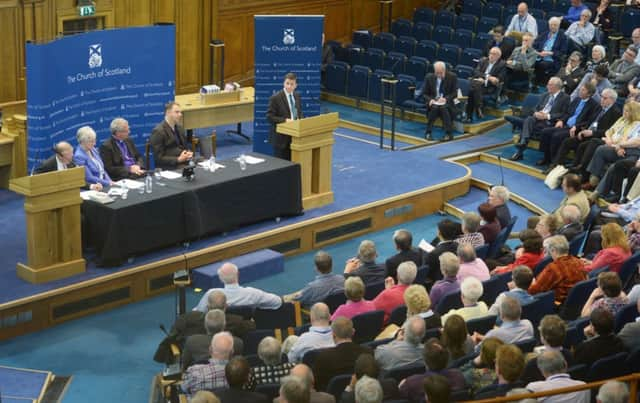Leaders: Kirk limited in its power to heal wounds


Also to be welcomed was the Kirk’s recent decision to hold a service of reconciliation in Edinburgh’s St Giles’ Cathedral on 21 September. In this, the Church was responding to a letter from the Queen calling on people of faith to “work together for the social good of Scotland whatever the outcome of the independence referendum”.
There is little doubt that the tone of recent public debate has become markedly polarised and fractious. That is only to be expected, but it is a cause for concern. There has been much talk in this referendum of the importance of retaining the “social union” with England, but just as important is the social union between Scots within Scotland. The Church of Scotland is committed to a position of neutrality on independence. However, its members said it was important to reflect on issues dominating public life. Few would disagree either with the Church’s concern over the potential for rancour and divisiveness to persist after the vote, or its desire to promote reconciliation. And it is easy to underestimate how big a task this may prove.
Advertisement
Hide AdAdvertisement
Hide AdBut it is only sensible to recognise there are limits to the Church’s role in this initiative, and to its power to pull the country together. The Church has a positive part to play and its role as an exemplar should not be underestimated. But there is a limit to the extent to which the Kirk can be a healing power for all Scots after the independence referendum vote.
Scotland today is a much more secular country than was the case even just a decade ago. It may still adhere to values that generally coincide with Christianity, but attendance at church is increasingly a minority pursuit. And among those Scots who still adhere to religious observance, that observance is split across many different faiths and denominations.
The Church of Scotland, through its Articles Declaratory underpinned by statute, can justly lay claim to its historical role as the national church. But if there were ever days when it could speak for the whole nation, those days are long gone.
In the light of this reality, caution should also be exercised over the Kirk’s request for special recognition in the drawing up of a constitution for an independent Scotland, should that moment arrive. The Kirk can and should be a positive force for good in Scotland, and an important voice in the national conversation, but in the 21st century it has no claim to preferential treatment – or even inclusion – in a modern Scottish constitution.
Smokers gasping for way to quit
BARELY had smokers turned to e-cigarettes to help them kick the habit – or simply make their nasty habit less socially offensive – than the health lobbies tut-tutted that this only made smoking more acceptable and would be a bad influence on the young. Many outdoor and sports events – the Commonwealth Games, for example – have banned e-cigarettes as a result.
But now comes research showing that smokers who resort to e-cigarettes to quit are more likely to succeed in cutting out the fags than those who use willpower alone, or nicotine replacement therapies: they could be more of a health boon than a health risk.
A survey of nearly 6,000 smokers found a fifth had quit with the aid of e-cigarettes – some 60 per cent higher than those who did not use the devices.
It hardly suggests resorting to e-cigarettes is a deeply pleasurable experience, still less habit-forming. The lead academic on the survey says e-cigarettes could substantially improve public health because of their widespread appeal and the huge health gains associated with stopping smoking. Indeed, it may not be long before e-cigarettes are available on the NHS.
Advertisement
Hide AdAdvertisement
Hide AdSmokers are already ostracised across the land. To face further criticism for their chosen method of trying to quit could have the undesired effect of encouraging a stoic defiance of those they brand as “health fascists”.
A more positive attitude would act as a further spur to committed smokers to give up – the desired outcome both for those who are still slaves to addiction and for the health service in a lower incidence of smoking-related illnesses.